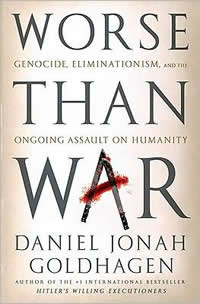Book Notes
 Daniel Jonah Goldhagen, Worse Than War; Genocide, Eliminationism, and the Ongoing Assault on Humanity (New York: PublicAffairs, 2009), 658pp.
Daniel Jonah Goldhagen, Worse Than War; Genocide, Eliminationism, and the Ongoing Assault on Humanity (New York: PublicAffairs, 2009), 658pp.
In his controversial and award-winning bestseller Hitler's Willing Executioners (1996), Daniel Goldhagen altered the debate in Holocaust studies by showing how and why ordinary citizens slaughtered six million Jews. In his newest book he extends his study to include what he calls "eliminationism." Goldhagen unapologetically describes his sense of calling not to rehash the interpretations of others, but to "reconceptualize, understand anew, interpret differently, explain adequately, and to propose workable responses to this catastrophic and systematic problem of eliminationism" (633–634).
Elimination takes five main form — transformation of a group's essential identity (eg, their language or religion), repression (enslavement, camps, apartheid, famine, segregation), expulsion and deportation (death marches), prevention of reproduction by systematic rape, and extermination. The myths, lies, denials, excuses, rationalizations, "self-exculpations," "prettified self-images," and "linguistic camouflage" of both active perpetrators and passive bystanders are legion. Although states alone have the power and means to eliminate a group, and political leaders bear unique responsibility, Goldhagen locates the problem in human agency. Eliminationism is not inevitable, accidental, a spontaneous eruption, or the work of "abstract forces or structures." We all have a choice.
Goldhagen begins his litany of colossal mass murder with the merciless annihilation of 80% of the Herero people of what is now modern Namibia by the imperial Germans in 1904. Harry Truman killed 300,000 Japanese. The Turks slaughtered 1.2 million Armenians and exported 800,000 more. Hitler, Kim Il Sung and his son Kim Jong Il, Pol Pot, Stalin, and Mao Zedong "made slaughtering a constitutive feature of their civilizations." The Hutu genocide of 800,000 Tutsis in Rwanda is well known, but in fact there were at least seven mutual, "iterative exterminationist episodes" since 1962 (129). In the Democratic Republic of Congo today some five million people have died in eliminationist campaigns. Darfur continues to smolder. The list is long, and very few times, places or peoples have been spared.
In the last century, between 127–175 million people were eliminated. They came from all regions of the world, and from all social, economic and political groups. The vast majority of these victims were killed in their own countries, by their fellow citizens, by willing and non-coerced murderers, and almost never with any substantial dissent. By Goldhagen's count, "mass murder has deeply scarred countries home to 4.4 billion people, two-thirds of the world's population" (273). Today civilian deaths and injuries outnumber military ones by a factor of nine to one (573). Eliminationism is thus "worse than war."
In addition to his own interviews and scholarly research, Goldhagen includes first person narratives from victims and perpetrators, along with graphic photographs. I would be hard-pressed to name a more powerfully disturbing book. The experts will quibble and qualify; cynics will claim the high ground of realism. If Goldhagen would actually eliminate the United Nations and similar organizations as worse than useless, and as enablers of slaughter, why should we imagine that his proposal for new institutions will work any better? Were some eliminationist campaigns really "easy" to stop with "little cost?" I would have appreciated more analysis of Israel's eliminationist deeds, especially given his insistence that "Political Islam" is our greatest eliminationist threat today.
"We must adopt the language of moral responsibility," says Goldhagen (529). We need to insist upon the notions of free choice and human agency. Since political leaders persuade their citizens to slaughter each other because of the near certainty of impunity, we need to "radically alter their cost benefit analysis" (568). And all of us can commit ourselves to the Judeo-Christian ethic of Proverbs 31:8–9: "Speak up for those who cannot speak for themselves, for the rights of all who are destitute. Speak up and judge fairly; defend the rights of the poor and needy."


